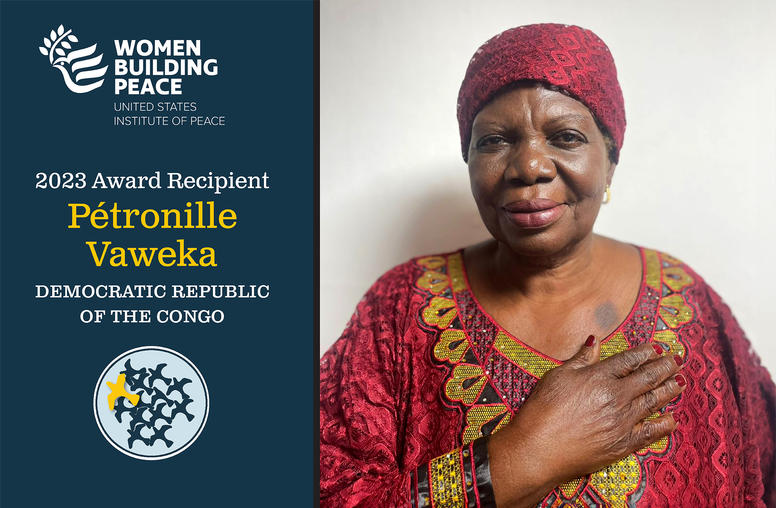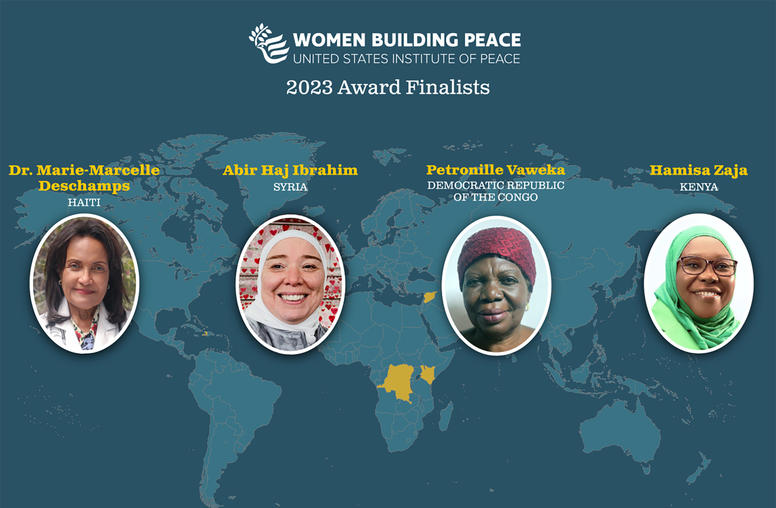USIP Provides Background, Expertise on Nuclear Posture Review
President Barack Obama on April 6 unveiled a new nuclear strategy in its just-released Nuclear Posture Review, calling it a significant step forward in reducing the role of nuclear weapons in security strategy. This new policy announcement comes shortly before the U.S. and Russia will meet in Prague to sign a new Strategic Arms Reduction Treaty, and in advance of the Global Security Summit in Washington, D.C. on April 12 and 13.
For Immediate Release, April 7, 2010
Contact: Lauren Sucher, 202/429-3822 or lsucher@usip.org
(Washington) - President Barack Obama on April 6 unveiled a new nuclear strategy in its just-released Nuclear Posture Review, calling it a significant step forward in reducing the role of nuclear weapons in security strategy.
This new policy announcement comes shortly before the U.S. and Russia will meet in Prague to sign a new Strategic Arms Reduction Treaty, and in advance of the Global Security Summit in Washington, D.C. on April 12 and 13.
The recent flurry of activity on nuclear policy raises wider questions about nuclear weapons and security, as well as international negotiations and arms control.
USIP presents a snapshot of its experts and work related to the Nuclear Posture Review (NPR) and nuclear security more broadly.
For background and commentary, we offer the following experts:
- Paul Hughes (nuclear security, international non-proliferation, Russia)
Senior Program Officer and Executive Director, QDR Independent Panel; former executive director of the Congressional Commission on the Strategic Posture of the United States, a bipartisan body headed by former Defense Secretaries William Perry and James Schlesinger; director of national security policy on the Army staff (2000-2002); former deputy director of the Office for Humanitarian Assistance and Anti-Personnel Landmine Policy in the Office of the Secretary of Defense (1996 to 2000).
Phone: (202) 429-7167
Cell: (301) 461-8910
E-mail: phughes@usip.org - Bruce MacDonald (nuclear security, international non-proliferation)
Senior director of USIP’s Arms Control and Nonproliferation Project and former senior director of the Congressional Commission on the Strategic Posture of the United States; project leader for the Council on Foreign Relations’ study of China, Space Weapons, and U.S. Security; former assistant director for national security at the White House Office of Science and Technology Policy; former member of the U.S. START delegation in Geneva.
Office Phone: (202) 429-3832
Cell Phone: (703) 346-3347
Email: bmacdonald@usip.org - Ambassador Jayantha Dhanapala (nuclear security, international non-proliferation)
Jennings Randolph Senior Visiting Scholar
President of the 1995 Nuclear Non-Proliferation Treaty Review and Extension Conference; undersecretary-general for Disarmament Affairs (1998-2003); and director of United Nations Institute for Disarmament Research (UNIDIR) (1987-1992).
Phone: 202-429-7164
E-mail: jdhanapala@usip.org
Additionally, the 2010 NPR has significant similarities and correlations with the findings of the Strategic Posture Commission, hosted by the Institute, and many of the commission’s experts played important roles in developing the new Nuclear Posture Review.
Below are key excerpts from the Strategic Posture Commission’s final report, released last spring, as relevant to the NPR.
1. On Nuclear Proliferation and Nuclear Terrorism
The NPR's first goal focuses on preventing nuclear proliferation and nuclear terrorism, which it calls the most pressing threats to the United States and the international security environment.
Strategic Posture Commission Excerpts:
- “[N]uclear terrorism against the United States and other nations is a very serious threat. This requires a much more concerted international response, one which the United States must lead.” (p.16)
- “To address the serious risk of nuclear terrorism, the United States needs strong intelligence and reenergized international cooperation through its deterrence, nonproliferation, and arms control efforts. The best defense against nuclear terrorism is to keep nuclear bombs and fissile material out of the hands of terrorists.” (p. 17)
- “The United States should adapt its strategic posture to the evolving requirements of deterrence, extended deterrence, and assurance. As part of an effort to understand assurance requirements, steps to increase allied consultations should be expanded.” (p. 17)
2. On Force Structure
The NPR says that the United States will maintain the nuclear triad of SLBMs, ICBMs, and heavy bombers, stating that "[retaining] all three Triad legs will best maintain strategic stability at reasonable cost, while hedging against potential technical problems or vulnerabilities." (p. 21)
Strategic Posture Commission Excerpts:
- “The triad of strategic delivery systems continues to have value. Each leg of the nuclear triad provides unique contributions to stability. As the overall force shrinks, their unique values become more prominent.” (p. 29)
3. On Declaratory Policy
The NPR makes a significant change in its policy, asserting that the “United States will not use or threaten to use nuclear weapons against non-nuclear weapons states that are party to the Nuclear Non-Proliferation Treaty (NPT) and in compliance with their nuclear nonproliferation obligations." (p. 15) The NPR states that the United States would only consider the use of nuclear weapons in extreme circumstances to defend the vital interests of the U.S. or its allies and partners. At the same time, it did not adopt a policy of no-first use of nuclear weapons, as some had called for.
Strategic Posture Commission Excerpts:
- “The United States should reaffirm that the purpose of its nuclear force is deterrence, as broadly defined to include also assurance of its allies and dissuasion of potential adversaries.” (p. 37)
- “It should not abandon calculated ambiguity by adopting a policy of no-first-use.” (p. 37)
- “The United States should make clear that it conceives of and prepares for the employment of nuclear weapons only in extreme circumstances.” (p. 37)
4. On the Nuclear Stockpile and Infrastructure
One of the most significant new policies outlined in the NPR is that "the United States will not develop new nuclear warheads.” (p. 39) It goes on to say that decisions on the maintenance and modernization warhead components will be governed by the Stockpile Management and Life Extension programs, and informed by the study of aging warheads "on a case-by-case basis.” (p. 39)
On the latter point, the administration endorsed the viewpoint of the Strategic Posture Commission, which stated that:
- "The decision on which approach to refurbishing and modernizing the nuclear stockpile is best should be made on a type-by-type basis as the existing stockpile of warheads ages.” (p. 45)
5. On Cooperation with Russia and China
The NPR says that, "[the] United States will pursue high-level, bilateral dialogues on strategic stability with both Russia and China which are aimed at fostering more stable, resilient, and transparent strategic relationships." (p. x)
Strategic Posture Commission Excerpts:
- “The United States should take the lead in renewing strategic dialogue with a broad set of states interested in strategic stability, including not just Russia and China but also U.S. allies in both Europe and Asia.” (p. 71)
- “The opportunities to further engage Russia as a partner in reducing nuclear dangers are important and should be seized. The United States must also continue to concern itself with issues of deterrence, assurance, and stability in the nuclear relationship with Russia.” (p. 16)
- “The opportunities to engage China are also significant. But here too the United States must balance deterrence and stability concerns with the opportunities for strategic cooperation.” (p. 16)
- “The moment appears ripe for a renewal of arms control with Russia, and this bodes well for a continued reduction in the nuclear arsenal. The United States and Russia should pursue a step-by-step approach and take a modest first step to ensure that there is a successor to START I when it expires at the end of 2009. Beyond a modest incremental reduction in operationally deployed strategic nuclear weapons, the arms control process becomes much more complex as new factors are introduced. One of the most important factors will be the imbalance of non-strategic nuclear weapons. In support of its arms control interests and interest in strategic stability more generally, the United States should pursue a much broader and more ambitious set of strategic dialogues with not just Russia but also China and U.S. allies in both Europe and Asia.” (pp. xviii-xix)
Explore Further
- For more about USIP’s work on nuclear security, read "On the Issues: The New Start."


